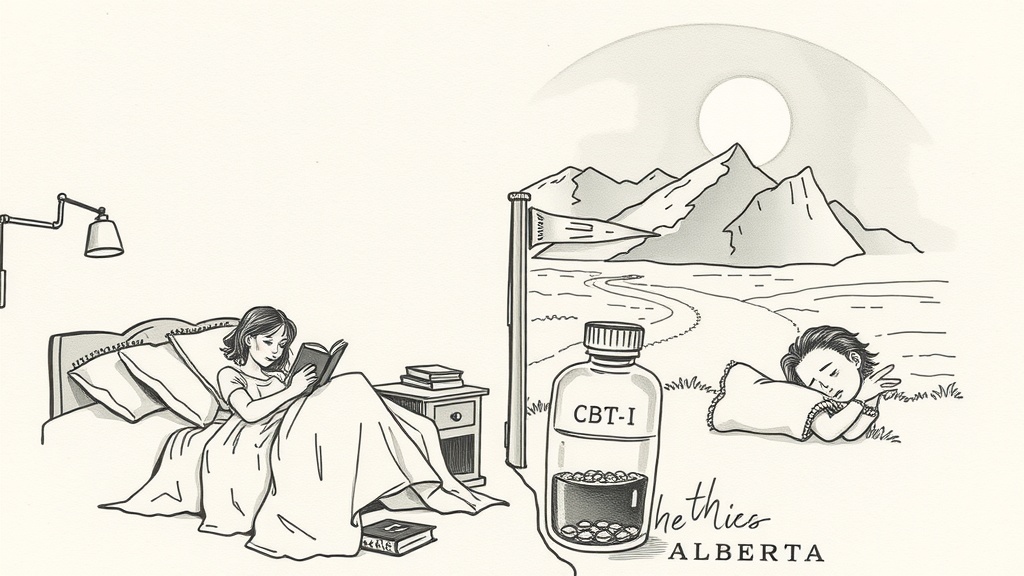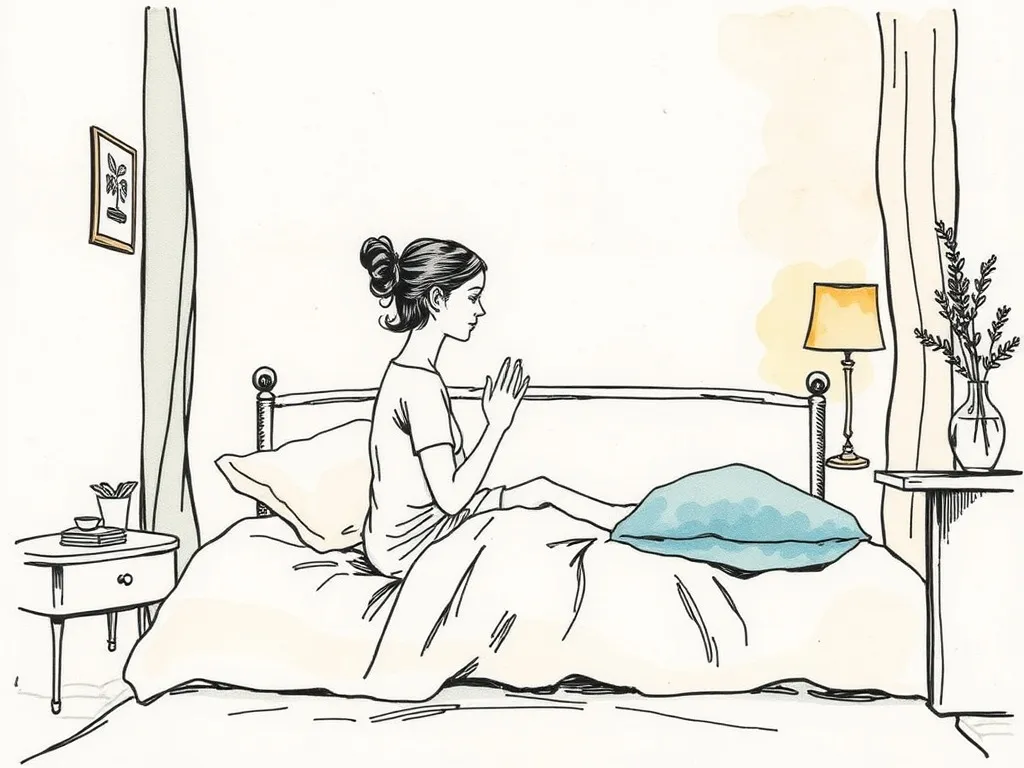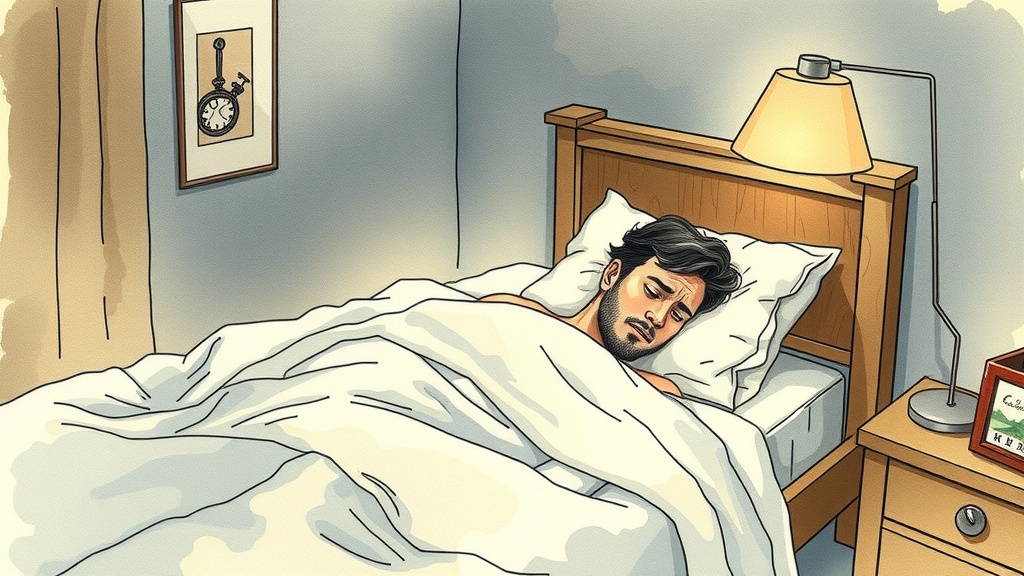· Don Schmidt · Guides · 10 min read
CBT-I vs. Sleeping Pills: An Alberta-Focused Guide to Making the Right Choice for Insomnia
Struggling with insomnia in Alberta? Explore the pros and cons of CBT-I versus sleeping pills to find the best, long-term solution for restful nights.

Introduction: Navigating Your Path to Better Sleep in Alberta
Insomnia is a pervasive challenge, affecting countless individuals across Alberta and beyond. The constant tossing and turning, the dread of another sleepless night, and the cumulative impact on daily life can be debilitating. When facing chronic insomnia, many Albertans find themselves at a crossroads: do I reach for a quick-fix sleeping pill, or do I invest in a longer-term, more sustainable solution like Cognitive Behavioral Therapy for Insomnia (CBT-I)?
This guide aims to demystify these two primary approaches to insomnia treatment, offering an Alberta-focused perspective on their benefits, drawbacks, and what to consider when making this crucial decision for your health and well-being. Understanding the nuances of each option is key to reclaiming your nights and improving your quality of life.
Understanding the Challenge: What is Insomnia?
Before diving into solutions, it’s important to grasp what insomnia truly is. It’s more than just an occasional restless night; it’s a persistent difficulty with falling asleep, staying asleep, or waking up too early and being unable to get back to sleep, leading to significant distress or impairment in daily functioning. Insomnia can be acute (short-term, often due to stress or life changes) or chronic (lasting three or more nights a week for at least three months). For many Albertans, chronic insomnia disrupts work, relationships, and overall mental and physical health.
Option 1: The Role of Sleeping Pills
For many, sleeping pills represent a tempting immediate solution to the agony of insomnia. They offer the promise of quick sleep onset, a seemingly effortless path to rest. These medications, broadly categorized, include benzodiazepines (like Ativan or Restoril), non-benzodiazepine hypnotics (often called “Z-drugs” like Ambien, Lunesta, or Imovane), and some antidepressants or antihistamines prescribed off-label for sleep.
How They Work and Their Immediate Appeal
Most sleeping pills work by enhancing the activity of GABA, a neurotransmitter in the brain that promotes relaxation and reduces brain activity. This can indeed help you fall asleep faster. For acute, short-term insomnia, perhaps brought on by a stressful life event or jet lag, a doctor might prescribe sleeping pills for a few nights to break the cycle of sleeplessness. Their primary appeal lies in their rapid effect.
The Downsides and Risks
However, the perceived convenience of sleeping pills often comes with a significant list of drawbacks. Long-term use can lead to:
- Dependence and Tolerance: Your body can become reliant on the medication to sleep, and you may need higher doses over time to achieve the same effect.
- Side Effects: Common side effects include dizziness, next-day drowsiness, confusion, memory problems, and impaired coordination, which can increase the risk of falls, particularly in older adults. Some individuals also experience unusual sleep behaviors, such as sleep-walking or sleep-eating, with no memory of them.
- Rebound Insomnia: When you stop taking the pills, your insomnia can return, often worse than before, as your body struggles to adapt without the medication.
- Masking the Root Cause: Sleeping pills treat the symptom (inability to sleep) but do not address the underlying causes of insomnia, such as stress, anxiety, poor sleep habits, or other medical conditions. This means the problem will likely persist once the medication is stopped.
- Interactions: They can interact dangerously with other medications, including alcohol, leading to severe sedation or respiratory depression. For many seeking to reduce reliance on medication, understanding options for getting off sleeping pills with CBT-I is a critical step.
In Alberta, access to sleeping pills is typically via prescription from a physician, who will weigh these risks against the potential benefits, usually recommending short-term use.
Option 2: Cognitive Behavioral Therapy for Insomnia (CBT-I)
Cognitive Behavioral Therapy for Insomnia (CBT-I) is widely recognized as the gold standard, first-line treatment for chronic insomnia. Unlike sleeping pills, CBT-I is a non-pharmacological, evidence-based approach that targets the thoughts, feelings, and behaviors that contribute to sleep difficulties. It’s a structured program, typically delivered over several sessions, that equips individuals with the skills to achieve lasting sleep improvement.
How CBT-I Works: A Multi-Component Approach
CBT-I is not a single technique but a comprehensive suite of strategies tailored to an individual’s specific sleep patterns and contributing factors. Here’s a breakdown of its core components:
- Cognitive Restructuring: This component helps you identify and challenge unhelpful thoughts and beliefs about sleep (e.g., “I’ll never be able to sleep without a pill,” “If I don’t get 8 hours, my day is ruined”). By replacing these with more realistic and positive thoughts, anxiety surrounding sleep can be significantly reduced.
- Stimulus Control: This involves re-associating your bed and bedroom with sleep and relaxation, rather than wakefulness and frustration. Rules include only using the bed for sleep and sex, getting out of bed if you can’t sleep within 20 minutes, and maintaining a consistent wake-up time.
- Sleep Restriction: Paradoxically, this involves temporarily limiting the time you spend in bed to consolidate sleep and increase your sleep drive. As sleep efficiency improves, your time in bed is gradually increased.
- Sleep Hygiene Education: While not a standalone cure, good sleep hygiene practices (e.g., a consistent sleep schedule, creating a dark/quiet/cool bedroom, avoiding caffeine/alcohol before bed, regular exercise) are foundational to healthy sleep and are reinforced in CBT-I.
- Relaxation Training: Techniques such as progressive muscle relaxation, diaphragmatic breathing, and mindfulness can help reduce physical and mental arousal before sleep.
If you’re curious about the mechanics behind this powerful therapy, a deeper dive into how CBT-I works can provide further insight. This multifaceted approach retrains your brain and body to sleep naturally, addressing the root causes of insomnia rather than just masking symptoms. For those looking for drug-free sleep treatment options, CBT-I is an excellent choice.
Benefits and Challenges of CBT-I
Benefits:
- Sustainable and Long-Term: CBT-I teaches you skills you can use for life, leading to lasting improvements in sleep quality without the need for ongoing medication.
- No Side Effects: Being a non-pharmacological therapy, it avoids the side effects associated with sleeping pills.
- Addresses Root Causes: It tackles the underlying cognitive and behavioral factors contributing to insomnia.
- Improved Overall Well-being: Better sleep leads to improved mood, concentration, energy, and overall quality of life.

Challenges:
- Requires Commitment: CBT-I demands active participation and adherence to strategies, especially in the initial stages.
- Not Instant: Improvements are gradual, and some individuals may experience temporary worsening of sleep (e.g., during sleep restriction) before significant improvement.
- Accessibility: While growing, access to qualified CBT-I therapists in some parts of Alberta may still be a challenge compared to getting a prescription.
Head-to-Head: CBT-I vs. Sleeping Pills
Let’s directly compare these two approaches to highlight their fundamental differences:
| Feature | Sleeping Pills | CBT-I |
|---|---|---|
| Mechanism | Chemical alteration of brain activity | Behavioral and cognitive restructuring |
| Efficacy | Short-term relief, often loses effectiveness | Long-term, sustainable improvement |
| Side Effects | Drowsiness, dependence, memory issues, rebound | None (though initial discomfort may occur) |
| Root Cause | Masks symptoms | Addresses underlying causes |
| Duration | Best for short-term use | Structured program, skills are lifelong |
| Dependency Risk | High for chronic use | None |
While sleeping pills can provide immediate, albeit often temporary, relief, CBT-I offers a path to lasting sleep health by empowering you with tools to manage your sleep independently. For those in Alberta looking to transition away from medication, understanding the specific processes involved in getting off sleeping pills with CBT-I can be particularly valuable.
Making the Right Choice for Albertans
The decision between CBT-I and sleeping pills isn’t one-size-fits-all. It depends on several factors unique to your situation:
- Duration and Severity of Insomnia: For acute, temporary insomnia, a short course of sleeping pills might be considered. For chronic insomnia (lasting months or years), CBT-I is overwhelmingly recommended as the first-line and most effective long-term solution.
- Underlying Health Conditions: Your overall health, other medications you take, and any co-existing mental health conditions (like anxiety or depression) will influence the best approach.
- Personal Preference and Commitment: Are you looking for a quick fix, or are you ready to invest time and effort into a behavioral therapy that requires consistency? CBT-I requires active participation.
- Lifestyle: For Albertans engaged in demanding schedules, such as those in the oil and gas industry, CBT-I strategies for shift workers can be particularly beneficial, offering tailored approaches to maintain sleep health despite irregular hours. Similarly, CBT-I for seniors often includes considerations for age-related sleep changes and potential medication interactions.
Consulting a Healthcare Professional in Alberta
Your first step should always be to consult with a healthcare professional in Alberta. Your family doctor can assess your symptoms, rule out underlying medical conditions, and discuss appropriate treatment pathways. They may refer you to a sleep specialist, a psychiatrist, or a psychologist trained in CBT-I. Discuss your lifestyle, your goals for sleep improvement, and any concerns you have about medication or therapy.

Alberta-Specific Resources and Accessibility
Access to CBT-I in Alberta is growing. You can find qualified therapists through:
- Alberta Health Services (AHS): AHS may offer sleep clinics or programs that incorporate CBT-I, though wait times can vary.
- Private Practice Psychologists/Therapists: Many psychologists in private practice throughout Calgary, Edmonton, and other Alberta communities specialize in CBT-I. Check their websites or professional directories.
- Online CBT-I Programs: Several reputable online CBT-I programs, some of which are provincially endorsed or recognized, offer accessible and often more affordable alternatives, allowing you to complete therapy from home.
When considering medication, your GP is the gatekeeper. They will discuss the necessity, dosage, and duration of any prescribed sleeping pills, always emphasizing the importance of short-term use and exploring non-pharmacological alternatives.
FAQ: Your Questions Answered
Q1: Is CBT-I covered by Alberta Health Services?
While specific CBT-I therapy sessions by psychologists in private practice are generally not fully covered by Alberta Health Services (AHSC), many extended health benefits plans (employer or private) do cover psychological services. Some AHS sleep clinics may offer components of CBT-I within their scope. It’s best to check with your insurance provider and local AHS resources.
Q2: How long does CBT-I take to work?
Significant improvements in sleep can often be seen within 4-8 sessions, typically over 6-12 weeks. However, individual progress varies, and consistent application of the learned techniques is crucial for lasting results.
Q3: Can I take sleeping pills while doing CBT-I?
In some cases, especially at the beginning of CBT-I, a healthcare provider might recommend a gradual tapering of sleeping pills while you begin the therapy. The goal of CBT-I is ultimately to reduce or eliminate the need for medication, but this process should always be managed under medical supervision.
Q4: What are the most common side effects of sleeping pills?
Common side effects include dizziness, drowsiness the next day, balance problems, memory issues, and rebound insomnia when discontinued. Less common but more severe effects can include unusual sleep behaviors like sleepwalking or sleep-eating without recall.
Q5: Where can I find qualified CBT-I therapists in Alberta?
You can search professional directories for registered psychologists or therapists specializing in sleep disorders. The Canadian Sleep Society (CSS) and the Alberta Psychological Association (APA) websites may also offer resources or referral lists. Online CBT-I programs are also a growing and accessible option.
Conclusion: Embracing Restful Nights
Choosing between CBT-I and sleeping pills for insomnia is a significant decision. While sleeping pills offer a temporary reprieve, CBT-I provides a lasting solution by empowering you with the skills to overcome insomnia permanently. By understanding your options and consulting with Alberta’s healthcare professionals, you can make an informed choice that leads to sustained, restful sleep and a healthier, more vibrant life.
Assess Your Sleep Quality Today
Take our My Sleep Health Score assessment to get personalized insights about your sleep patterns and discover how CBT-I can help you achieve better sleep.

Don Schmidt
15+ years of experience in sleep therapy and Cognitive Behavioral Therapy for Insomnia (CBT-I). Passionate about connecting individuals struggling with sleep disorders to evidence-based, non-medical treatment solutions. Author of hundreds of articles and comprehensive guides on sleep health, CBT-I techniques, and overcoming insomnia. When not helping clients achieve better sleep, you can find me hiking with my family and dogs or enjoying a good book.
Ready to connect with a provider?
Allow us to connect you with a provider who can help.



